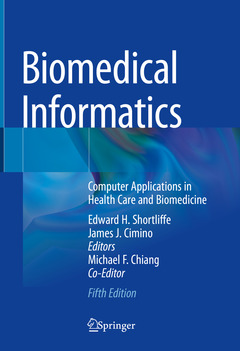Biomedical Informatics (5th Ed., 5th ed. 2021) Computer Applications in Health Care and Biomedicine

This 5th edition of this essential textbook continues to meet the growing demand of practitioners, researchers, educators, and students for a comprehensive introduction to key topics in biomedical informatics and the underlying scientific issues that sit at the intersection of biomedical science, patient care, public health and information technology (IT). Emphasizing the conceptual basis of the field rather than technical details, it provides the tools for study required for readers to comprehend, assess, and utilize biomedical informatics and health IT. It focuses on practical examples, a guide to additional literature, chapter summaries and a comprehensive glossary with concise definitions of recurring terms for self-study or classroom use.
Biomedical Informatics: Computer Applications in Health Care and Biomedicine reflects the remarkable changes in both computing and health care that continue to occur and the exploding interest in the role that IT must play in carecoordination and the melding of genomics with innovations in clinical practice and treatment. New and heavily revised chapters have been introduced on human-computer interaction, mHealth, personal health informatics and precision medicine, while the structure of the other chapters has undergone extensive revisions to reflect the developments in the area. The organization and philosophy remain unchanged, focusing on the science of information and knowledge management, and the role of computers and communications in modern biomedical research, health and health care.
Date de parution : 06-2021
Ouvrage de 1152 p.
17.8x25.4 cm
Thème de Biomedical Informatics :
Mots-clés :
Bioinformatics; Biomedical Decision Making; Clinical Decision-Support Systems; Clinical Research Informatics; Consumer Health Informatics; Electronic Health Record Systems; Health Information; Imaging Informatics; Information Technology Policy; Patient Monitoring Systems; Patient-Centered Care; Personal Health Records; Software Engineering for Health Care; Telehealth; big data



